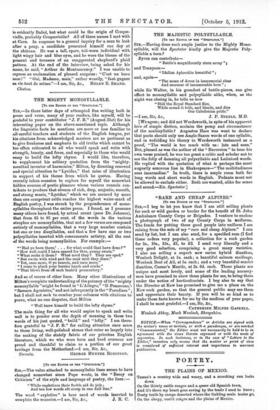THE MAJESTIC POLYSYLLABLE.
[To TEE EDITOR or THII "SFECTATOR."1 SIR,—Having done such ample justice to the Mighty Mono- syllable, will the Spectator kindly give the Majestic Poly- syllable a turn ?
Byron can contribute- " Battle's magnificently stern array "; and Tennyson- " Idalian Aphrodite beautiful";
and, again—
"The moan of doves in immemorial elms And murmur of innumerable bees "; while Sir Walter, in his grandest of battle-pieces, can give effect to monosyllable and polysyllable alike, when, as the night was closing in, he tells us how " Still the Royal Standard flies,
While round it toils, and bleeds, and dies
Our Caledonian pride."
[We agree; and did not Wordsworth, in spite of his apparent love of simple diction, acclaim the pomp and circumstance of the multisyllable ? Augustus Hare was wont to declare that poets should only use Anglo-Saxon words of one syllable, and in unfolding his theory to Wordsworth instanced as a proof, "The world is too much with us : late and soon." But, pleased as was the author of the " Excursion " to hear his own verse praised, he was too great a critic and scholar not to see the folly of damning all polysyllabic and Latinized words. He replied with the quotation of what is perhaps the most augustly sonorous line in Shakespeare—" The multitudinous seas incarnadine." In truth, there is ample room both for long words and short words in English. Pedants must not be allowed to exclude either. Both are wanted, alike for sense and sound.—En. Spectator.]


































































 Previous page
Previous page